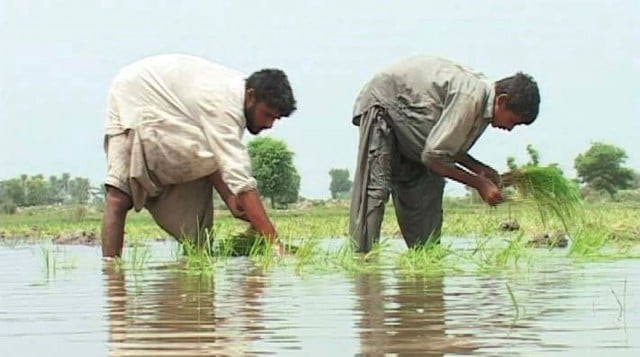What happened to the land where the water didn’t hit?
Farmers are in a different kind of anguish - the kind that comes from a shortage of water.

These are the paddy growers of upper Sindh, for whom water is a vital ingredient. But ironically in order to prevent destruction the key canals irrigating their land were closed when the floods came.
According to executive engineer Ahmed Abro, irrigation officials were told to close all major canals when the flood arrived at Sukkur Barrage. The Rice Canal, which starts at Sukkur Barrage and ends at Mehar, Dadu, was also closed under these directives. If opened, Abro said that the water would have coursed its way through the canals to Dadu and would have further damaged the already flooded area. “We have opened the Rice Canal now and are hoping that the harvest can be saved,” said Abro.
However, most farmers in the area did not share Abro’s optimism. They complained that the crop had dried up since it needs one and a half feet of standing water, which did not arrive in time as the harvesting season ends in August. Moreover, the seeds had also dried due to a lack of water and could not be sown, thus eliminating any chances of being able to plant late.
Abdul Mannan, who had been waiting for water for two months to harvest the crop, said that he had lost his yield. Shamsuddin, another farmer, said that 50 per cent of his paddy seeds have been destroyed and that the chances of growing the crop on his 50 acres of land were fairly bleak as the season for cultivation was long gone.
Both farmers thought it unlikely that they would grow any paddy crop this year. “The government has promised Rs20,000 to flood survivors, which is a good thing. But they also need to think about helping the farmers who have lost everything due to a lack of water,” said Ghulam Hussain, a farmer. He had taken a loan of Rs70,000 to cultivate his land but he won’t be able to pay it off now.
With the exception of the cost of fertiliser, which is borne by the landlord and the farmer, the other expenses - from sowing to harvesting - are borne by the farmer alone. “I borrowed money to buy seeds, labour, fuel and food,” said Hussain. “I was supposed to return it with the money I would have earned from the harvest, but now my crop is damaged. What will happen to me?”
The water shortage has also become a bone of contention among the growers, who are fighting over what little water trickles down the canals. Furthermore, sources revealed that certain “influential people” have also tried to divert water to their land through illegal water channels.
One of these men was identified as a former nazim of UC Bohar, who owns 500 acres. According to sources, he has taken a direct connection from the Banghar Acha Branch without the permission of the government. Sources alleged that this landlord had ignored the water distribution system in the area and plugged an illegal water course into the branch to save his own yield. They added that the irrigation officials were reluctant to do anything regarding the matter as influential people like him had put armed men in the fields to protect their turf.
Similarly, water from the Atha Minor Branch, Kor Branch, Sardar Wah Branch and the Nasir Branch is also being diverted through illegal connections, sources claimed. When contacted, MPA Ghulam Mujjadid Isran, who is a Pakistan Peoples Party representative in the area, said that no one has complained to him. He added that he will conduct a survey and take action against the people who are found guilty of stealing water.
Published in The Express Tribune, September 16th, 2010.


















COMMENTS
Comments are moderated and generally will be posted if they are on-topic and not abusive.
For more information, please see our Comments FAQ